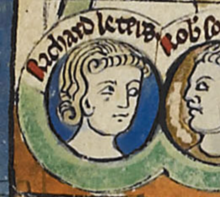Richard III, Duke of Normandy
| Richard III | |
|---|---|
 | |
| Duke of Normandy | |
| Reign | 28 August 1026 – 6 August 1027 |
| Predecessor | Richard II |
| Successor | Robert I |
| Born | 997/1001 Duchy of Normandy |
| Died | 6 August 1027 Duchy of Normandy |
| House | Normandy |
| Father | Richard II, Duke of Normandy |
| Mother | Judith of Brittany |
Richard III (997/1001 – 6 August 1027) was the duke of Normandy who reigned from August 1026 to his death. His brief reign opened with a revolt by his brother.
Life
[edit]Richard III was the eldest son of Richard II of Normandy and Judith of Brittany. Around 1026, Richard was sent by his father in command of a large army to rescue his brother-in-law, Reginald, later Count of Burgundy, by attacking bishop and count Hugh of Chalon, who had captured and imprisoned Reginald in Chalon-sur-Saône.[1]
When Richard II died in August 1026, his eldest son, Richard III, became Duke of Normandy. Shortly after his reign began his brother Robert, discontented with his province of Hiemois on the border of Normandy, revolted against his brother. He laid siege to the town of Falaise, but was soon brought to heel by Richard who captured him, then released him on his oath of fealty. No sooner had Richard disbanded his army and returned to Rouen, when he died suddenly (some say suspiciously). The duchy passed to his younger brother Robert I.[2]
Marriage
[edit]In January 1027, he was married to Adela, of a noble lineage. She is usually identified with Adela, a younger daughter of King Robert II of France, who married to Baldwin V, Count of Flanders after Richard's 6 August 1027 death.[3]
Issue
[edit]Richard's marriage to Adela was childless.
By an unknown woman, he had two children:
- Alice, who married Ranulph, Viscount of Bayeux[4][5]
- Nicholas, monk at Fecamp, Abbot of Saint-Ouen Abbey, Rouen (died 26 Feb 1092)[4][6]
References
[edit]- ^ François Neveux, A Brief History of the Normans, trans. Howard Curtis (Constable & Robbinson, Ltd, London, 2008), pp. 97–8
- ^ David Crouch, The Normans: The History of a Dynasty, (Hambledon Continuum, 2007), p. 46
- ^ Detlev Schwennicke, Europäische Stammtafeln: Stammtafeln zur Geschichte der Europäischen Staaten, Neue Folge, Band III Teilband 1, Herzogs und Grafenhäuser des Heiligen Römischen Reiches Andere Europäiche Fürstenhäuser (Marburg, Germany: Verlag von J. A. Stargardt, 1984), Tafel 11
- ^ a b Detlev Schwennicke, Europäische Stammtafeln: Stammtafeln zur Geschichte der Europäischen Staaten, Neue Folge, Band III Teilband 1, Herzogs und Grafenhäuser des Heiligen Römischen Reiches Andere Europäiche Fürstenhäuser (Marburg, Germany: Verlag von J. A. Stargardt, 1984), Tafel 79
- ^ See David C. Douglas, William the Conqueror (1977): 93 (“At the beginning of Duke William’s reign the vicomte of the Bessin was Rannulf, who was the son of a vicomte named Anschitil. He married a daughter of Duke Richard III and was among the defeated rebels at Val-ès-Dunes. None the less, the office continued in the family, for he was succeeded by another Rannulf (II) who was established at Avranches before the Norman conquest, and who survived until after April 1089. Moreover, this second Rannulf married Maud, daughter of Richard, vicomte of the Avranchin, thus linking together two powerful vice-comital dynasties which were later in turn to determine the succession of the earldom of Chester.”).
- ^ David C. Douglas, William the Conqueror (University of California Press, 1964), p. 32. See also Wailly et al., Recueil des Historiens des Gaules et de la France 23 (1894): 379 (E Directorio Monasterii Sancti Audoeni Rotomagensis, Ex Calendario: “26 Febr. Obiit Nicholas abbas.”), 385 (“Selon cheu qui est contenu es croniques des Normans, Richart li tiers, duc de Normendie, fix du secont Richart duc, out un fix appelé Nichole, qui fu moine à Fescampe, et après fu abbe de l’abaie de Saint-Ouen de Rouen”), 387 (Extrait des Chroniques de Saint-Ouen de Rouen: Nicholas, Abbot of Saint-Ouen, Rouen styled “son of Duke Richard III” [Nichole, fix au tiers duc Richart de Normendie]).
